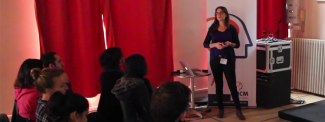The emergence of multidisciplinary, bold and innovative original research projects carried out by the Institut du Cerveau - ICM’s young talents, thanks to the Bolloré Group support, is the Institut du Cerveau - ICM's Brain Booster Challenge bet.
This year, 60 doctoral and post-doctoral students from the whole world, working within various teams of the Institut du Cerveau - ICM met for 3 days to share their research work, their outlooks on neurosciences and their desires for the future.
This brainstorming has led to the emergence of new collaborative projects. After maturation and completion, seven projects have been submitted to a selection committee which has selected three of them based on relevance criteria, scientific impact, transversality, and originality.
Thanks to the Bolloré group support, these creative and original research projects will be implemented in 2016. These young researchers will thus contribute to the next scientific advances, bringing hope for many patients with pathologies of the nervous system.
BRAIN BOOSTER CHALLENGE IS :
- 3 workshop days
- 60 doctoral and post-doctoral students
- 7 developed projects
- 3 selected projects
- 1 sponsor
- 1 year to complete each project
SELECTED PROJECTS
A new approach to study schizophrenia and test new therapeutic solutions.
by :
Cristina DONATO, 1st year PhD student in Alberto Bacci's team
Martin MONTMERLE, 2nd year PhD student in Alberto Bacci's team
Benjamin GALET, 1st year PhD student in Philippe Ravassard's team
A new way to popularise neuroscience.
by :
Maxime BOUTRY, 2nd year PhD student in Alexis Brice's team
Cynthia LEFEBVRE, 2nd year PhD student in Séverine Boillée's team
Emilie POIRION, 1st year PhD student in Catherine Lubetzki and Bruno Stankoff's team
Charles SANSON, 2nd year PhD student in Anne Baron and Brahim Nait Oumesmar's team
A new technique to enhance brain nerve fibres visualisation in order to predict, diagnose, and treat neurodegenerative diseases.
by :
Isaac Adanyeguh, 3rd year PhD student in Alexis Brice's team
Fatma Gargouri, 3rd year PhD student in Stéphane Lehéricy's team
Lizbeth Mondragon, 2nd year PhD student in Luc Mallet's team
Elise Marsan, 3rd year PhD student in Stéphanie Baulac and Eric LeGuern's team
Sophie Sébille, 2nd year PhD student in Etienne Hirsch's team.







